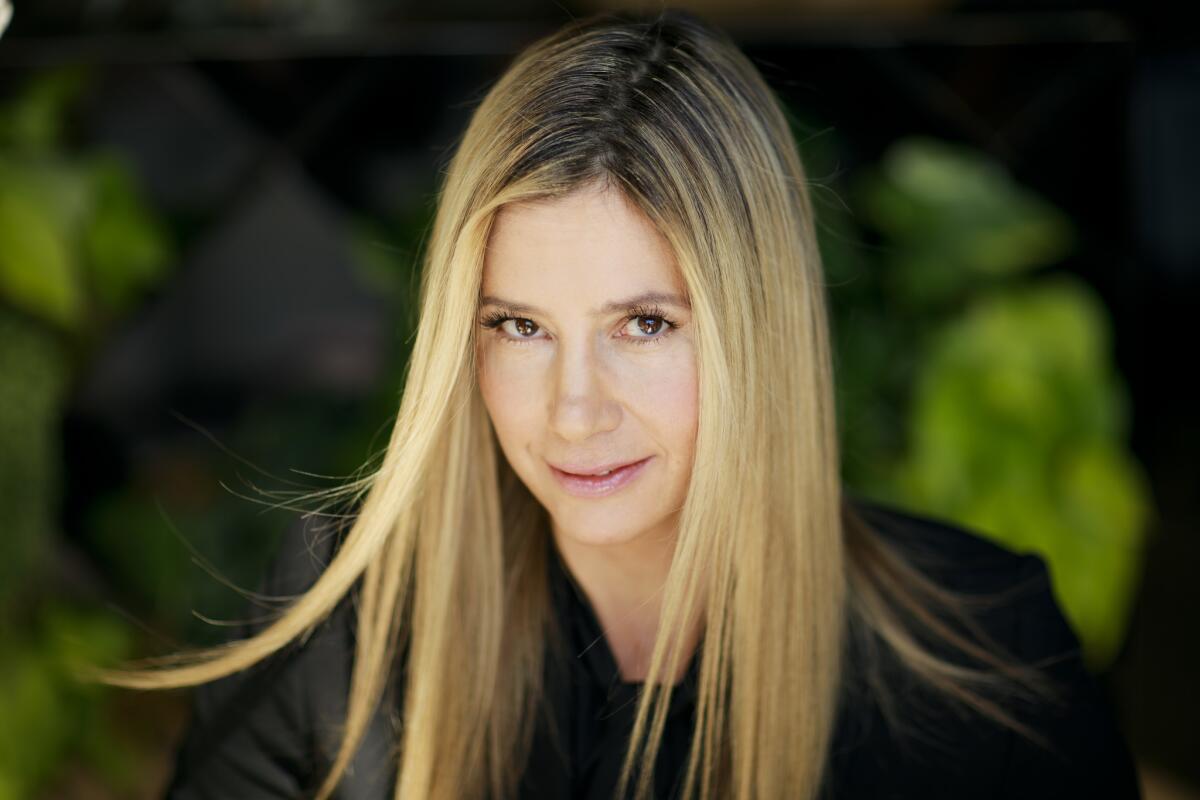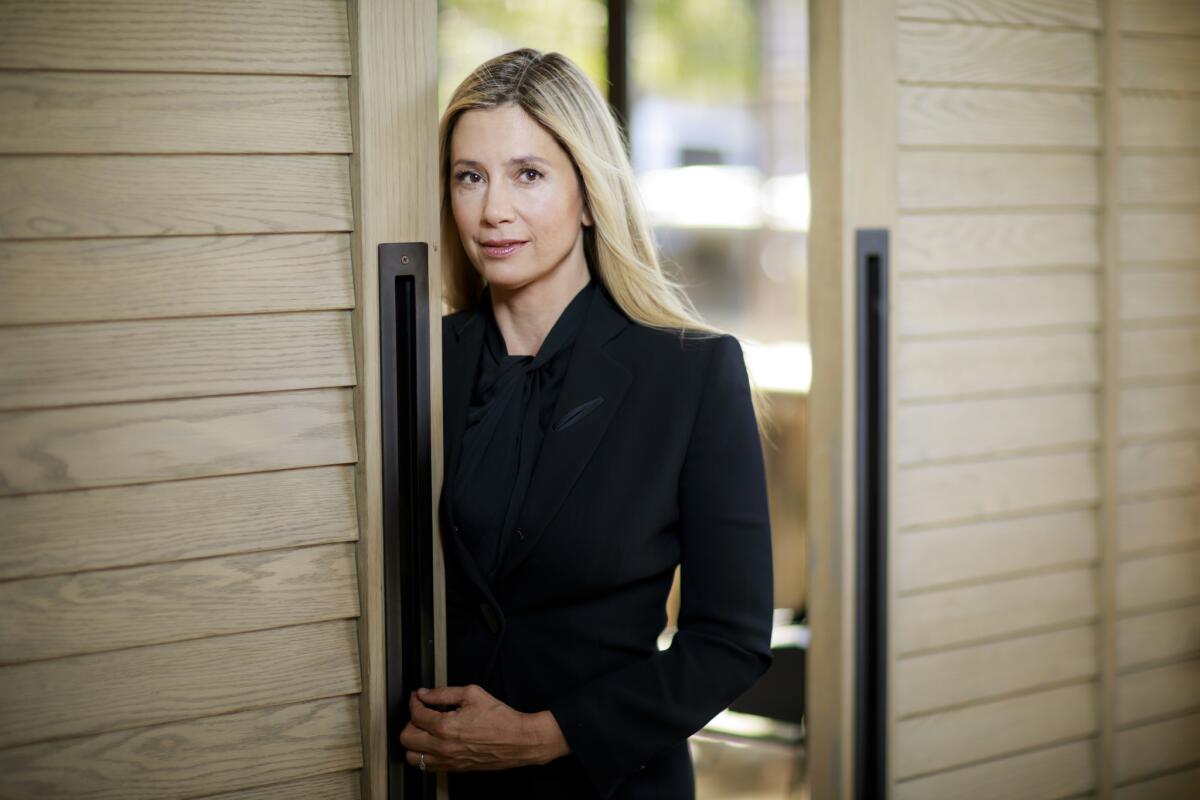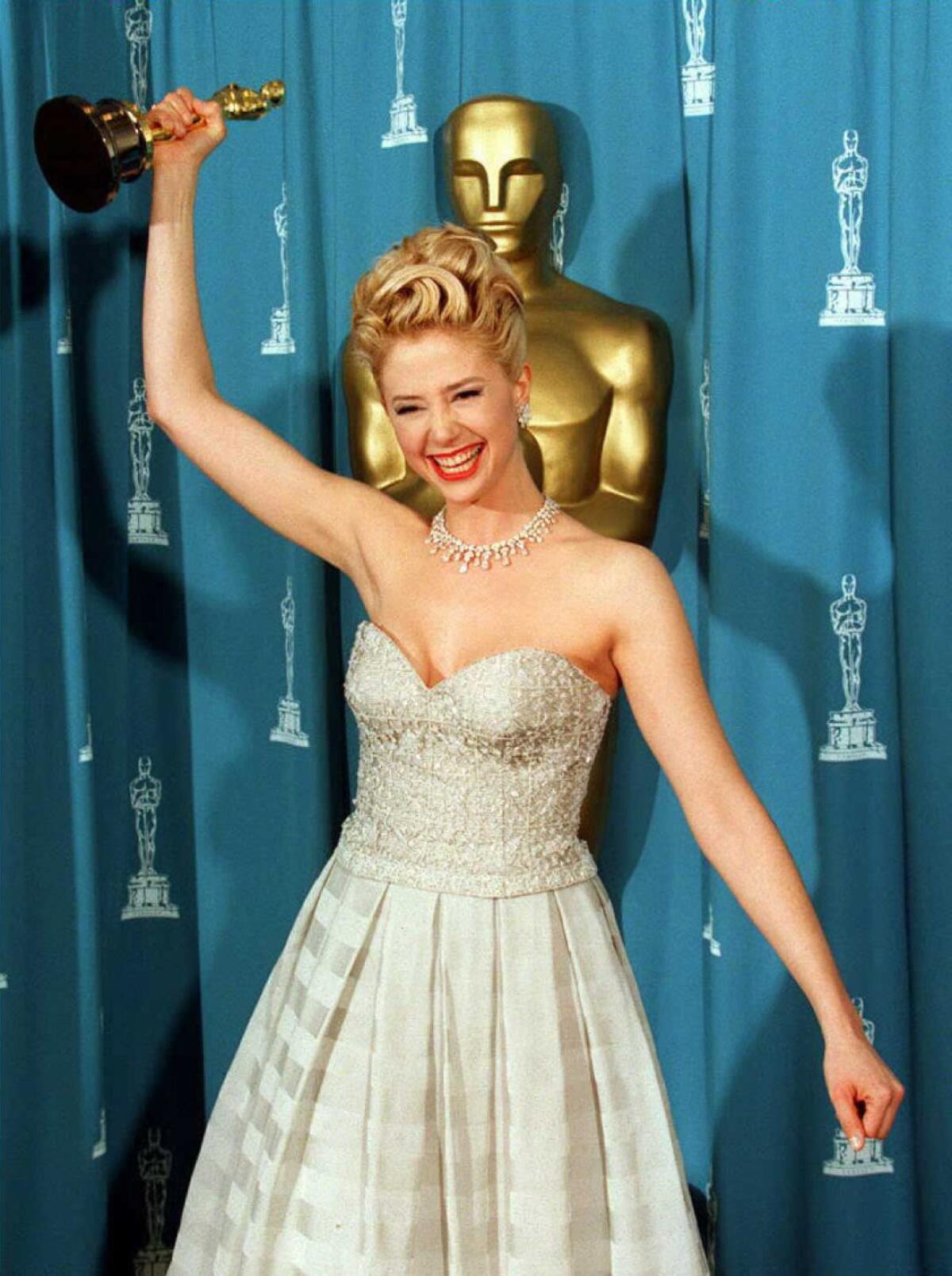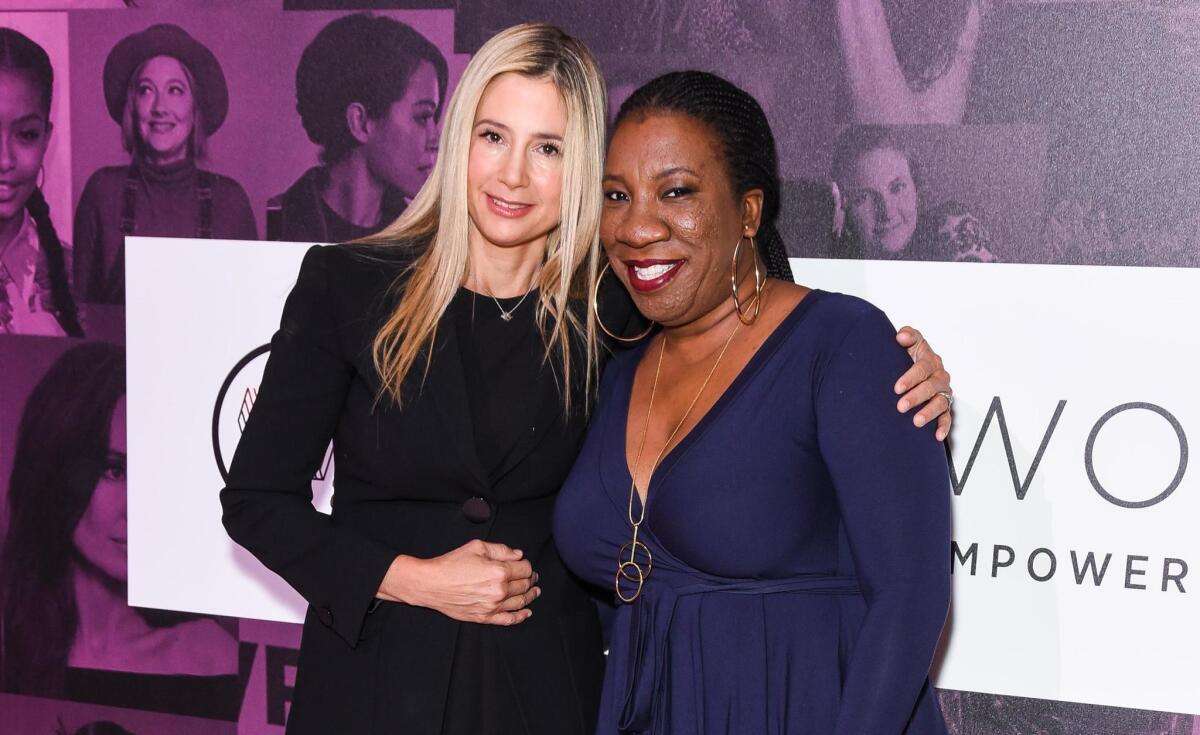‘It’s been a hard year, not going to lie’: Mira Sorvino on ‘Startup’ and the cost of saying #MeToo

- Share via
Reporting from New York — When Mira Sorvino was 10 years old and her parents were in the hospital with her newborn brother, she finished reading “The Diary of Anne Frank” and burst out crying. Her German babysitter, Paula, heard her weeping and came to see what was wrong.
“I said, this is so terrible, all these lives just snuffed out. All this possibility just gone. This little girl was like me. And she said, ‘No, no, they’re all lying. Many more Germans died than Jews. Only 600,000, not 6 million,’” Sorvino recalled recently, with disbelief on her face. “I was 10, but I was old enough to know that what she was saying was wrong.”
She told her parents about the experience which, says the actress, is “burned into my memory, and made me committed to all these social-justice causes.” It also provided an early lesson in the importance of speaking out — something the 51-year-old Oscar-winner has come to be known for in the past year, since she went on the record to accuse film producer Harvey Weinstein of sexual harassment and helped ignite the #MeToo movement.
Over a long, candid and sometimes difficult conversation, Sorvino opened up about the role she has played in the global reckoning, and the painful memories it has dredged up. But she also expressed excitement and optimism about her career. After decades away from the spotlight, she is in the midst of a hard-fought comeback.

I just felt iced out....I couldn’t be in any studio movies for a decade and a half.
— Mira Sorvino
In the past year, she’s played a Gwyneth Paltrow-esque lifestyle entrepreneur on ABC’s “Modern Family” and a CIA officer in the miniseries “Condor” on AT&T’s Audience network. She has a role in the upcoming buddy movie “Stuber,” with Kumail Nanjiani, and can currently be seen in the tech drama “Startup” as Rebecca Stroud, an oddball NSA agent who eats the same fast-food burger every day because she’s scared of food-borne illness. Her character is “very, very lonely and she’s chosen Mother USA as her whole identity, her whole life, her whole family,” Sorvino says. Her character’s quirks are a “way of holding on to the Earth as it’s spinning.”
She describes the series, which is available on the streaming network Sony Crackle, as “Shakespeare set in the tech world.” Her character, Rebecca, speaks with traces of a Southern accent. The actress has a knack for distinctive voice work, dating back to “Mighty Aphrodite,” where she played a prostitute who spoke in unforgettable high-pitched yet raspy tones, and “Romy & Michele’s High School Reunion,” where she portrayed a throaty Valley Girl.
In the Sorvino household in suburban Tenafly, N.J., everyone did voices around the dinner table — especially her father, actor Paul Sorvino.
Though the “Goodfellas” star encouraged his children to pursue other careers, young Sorvino wanted to be an actor, an astronaut or an anthropologist when she grew up. Performing was always in the picture. Sorvino and her childhood playmate, actress Hope Davis, wrote and performed in a play called “The Dutch Doll,” which they staged for neighbors. When she had to kiss a boy (on the cheek) in a fifth-grade production of “H.M.S. Pinafore,” her father gave her an early acting lesson, advising her to pretend the boy was her No. 1 crush, Elvis Presley.
Geographically speaking, Sorvino spent her childhood well outside Hollywood — except for the brief period her family lived in California while her father starred in the short-lived CBS sitcom “We’ll Get By.” When the Alan Alda-created series was canceled, the family returned to New Jersey. Her parents decided that her mother, Lorraine, would stay at home in New Jersey with the kids while Paul worked — a choice that, while understandable, contributed to the eventual demise of their marriage. Today Sorvino and her husband, actor Christopher Backus, have four kids and an agreement they can’t spend more than three weeks apart.
A malevolent hand
As an undergraduate at Harvard, Sorvino majored in East Asian literature and culture, writing a thesis about racial conflict in China. Although she loved academics, she occasionally auditioned for film roles and sometimes felt conflicted about which path to follow. She was visiting her father in California during summer vacation when she found out, in the same day, that she’d been passed over for parts in “Mystic Pizza” and “Dead Poets Society.” As she did laps in her father’s pool — Sorvino has an uncanny memory for these kinds of details — she went back and forth about what to do next: stay in school or take a semester off to focus on her career. The elder Sorvino had his friend, Warren Beatty, call and tell her to stay in school. She listened.

After graduation, Sorvino read scripts for Robert De Niro’s company, Tribeca Productions, but soon decided to focus all her energy on acting. In quick succession, she was cast in Whit Stillman’s “Barcelona” and Robert Redford’s “Quiz Show.” Then in 1995 came “Mighty Aphrodite,” a Woody Allen comedy about a man (Allen) who discovers the biological mother of his gifted adopted son happens to be a sex worker. Sorvino remains one of the few performers to win an Academy Award for a comedic performance, but fairly or not, she’s sometimes cited as a victim of the Oscar curse. While she starred opposite Lisa Kudrow in “Romy & Michele’s High School Reunion,” a highly quotable cult comedy, and in “Mimic,” a sci-fi thriller about deadly cockroaches directed by Guillermo del Toro, her career cooled in the years that followed her Oscar win. She remained busy in projects such as the Holocaust drama “The Grey Zone” and the Lifetime miniseries “Human Trafficking,” but the plum roles in studio releases dried up.
She returned to the public consciousness last October, when she became one of the first Hollywood stars to go on the record with allegations of sexual harassment against Weinstein. In a New Yorker article written by Ronan Farrow, whose estranged father had directed her in “Mighty Aphrodite,” Sorvino accused Weinstein, who distributed the film, of making unwanted physical contact and “chasing her” around a hotel room at the Toronto International Film Festival in 1995. In a later incident, she said the film producer had shown up uninvited at her apartment in the middle of the night with what she felt were malign intentions. (Weinstein has denied all charges of sexual misconduct.)
She long suspected that reporting the incident — she told an employee at Miramax — had a negative effect on her career. That hunch was seemingly confirmed when director Peter Jackson said he was told by Miramax to avoid casting Sorvino and Ashley Judd, another of Weinstein’s accusers, in “The Lord of the Rings” trilogy because they were “nightmare[s].” Filmmaker Terry Zwigoff said he was discouraged from working with Sorvino in “Bad Santa” for similar reasons. And the “difficult” rap seems to have gained traction in the press: some coverage of Sorvino in the years following her Oscar win cites her prickly reputation without much supporting evidence.
“The idea that there was this malevolent hand that actually had changed the course of my professional life was devastating to me,” she says.
“I was like, that’s why I’ve had a bad downturn in my career. Why I couldn’t be in any studio movies for a decade and a half. I won an Oscar. My work hasn’t changed. My performances are still comparable to my old performances. Just the access was denied,” says Sorvino, who acknowledges she “hates” talking about this period in her life.
“I just felt iced out, but I didn’t know that it went anywhere beyond just [Weinstein’s] particular films. So to feel like it was this broad-reaching thing that affected my entire career was really, really hard to handle. Because that’s when I had the biggest potential to solidify my career as a leading lady, and to make the kind of economic strides that would have secured my family forever. And we’ve had some lean years over the last ten years. I have four kids. And to not always be able to provide for them in the way that we would like to is really awful.”
Deep wounds
Even after her own encounters with Weinstein, Sorvino says she was “absolutely shocked by the extent” of the accusations against him — she was aware of just one other actress, Sophie Dix, with a story similar to hers — and also by the pervasiveness of the abuse that has come to light elsewhere in society.
Being at the center of a cultural sea change has been challenging for Sorvino.
“It’s been a hard year, not going to lie,” she says, her eyes welling up and her body tensing as she speaks. “What happened with Harvey Weinstein was not the first thing to happen to me.”
Sorvino says she was violently sexually assaulted as a teenager, an attack that “was quite severe and terrifying and life-threatening.” Although she reported it to the police, “Nothing was done about it. It taught a very bad lesson to my teenage self that if you do go to the authorities, nothing happens.” The experience inspired her to join the crew team while at Harvard, because her assailant had been able to “completely physically overpower” her.
In another incident from her teenage years, a casting director tied her to a chair and gagged her with a condom — presumably as part of an audition, but clearly inappropriate.
“All of those traumas resurfaced once I came out about Harvey,” she explains. “They were like festering but covered wounds. I think that a lot of people in this #MeToo generation will tell you it is re-traumatizing to speak out. Because you start examining it again, and reliving it, and history starts repeating itself in your mind. I find myself much more angry about it, because in the past I tried to make it no big deal to myself. And now I look back at the teenage self, and I’m like, that is so terrible that that happened to you, and you have a right to be angry at your attacker.”

The reckoning also forced Sorvino to reconsider “Mighty Aphrodite,” the film that made her a star. In an open letter published in January by the Huffington Post, she apologized to Allen’s daughter, Dylan Farrow, saying she now believed the allegations and vowed she would never work with the filmmaker again.
“I loved making that film, Sorvino says. “It was a highlight of my memory. I will always be grateful for the opportunity and the experience, and I’m very grateful for the Oscar. But, you know, it’s that mixed, that terrible mixed feeling.”
She explains that she made “Mighty Aphrodite” when she was “a young woman in a culture that was not very ‘MeToo’ at the time, where the tradition was to believe ‘completely innocent until proven guilty,’ rather than ‘where there’s smoke, there’s fire.’ You know, mea culpa. I should have looked further. When I was offered the role, I should have been like, ‘Wait, wasn’t he accused of molesting his daughter? ’ I did not do my due diligence. And I was not nearly as aware of all these issues as I am now, and that’s my fault. I will never blame that on anybody else but myself.”
Sorvino, who is also a United Nations goodwill ambassador to combat human trafficking, has increasingly turned to activism. She championed anti-sexual harassment legislation in California, under the hashtag #TakeTheLead, which was signed by Gov. Jerry Brown, and she continues to advocate for measures he vetoed that would ban forced arbitration and extend the filing deadline for sexual harassment claims. She also wants to work on educating young people in schools about consent and predatory behavior, with the goal of “end[ing] the frat boy culture that sees women as meat.” Quoting #MeToo founder Tarana Burke, she adds, “If you can teach kids to not run with scissors, you can teach people to not touch other people when they don’t want to be touched.”
The legislative wins in California are “something we can show for the fight of this year,” Sorvino says. “We took our pain and we put our shoulders into it and this happened.”
ALSO
Mira Sorvino joins Greta Gerwig in severing ties with Woody Allen
‘Phoenixes’ Ashley Judd, Mira Sorvino talk Weinstein, Time’s Up on Oscars red carpet
Mira Sorvino says Weinstein arrest is ‘really good first step’
See the most-read stories in Entertainment this hour »
Follow me @MeredithBlake
More to Read
The complete guide to home viewing
Get Screen Gab for everything about the TV shows and streaming movies everyone’s talking about.
You may occasionally receive promotional content from the Los Angeles Times.






